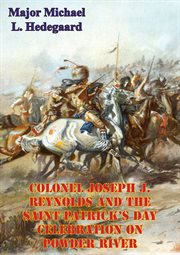Nonfiction
eBook
Details
PUBLISHED
DESCRIPTION
1 online resource
ISBN/ISSN
LANGUAGE
NOTES
The Battle of Powder River occurred on 17 March 1876 in southeastern Montana. Historians and researchers have consistently overlooked the importance of this battle on the outcome of the Great Sioux War of 1876. Colonel Joseph J. Reynolds set out to destroy the Indian camp established by the combined Cheyenne and Oglala Sioux in order to push the Indians back to the reservations and allow miners to enter the Black Hills to mine gold. Reynolds failed to accomplish this mission. The intelligence from his Indian scouts was flawed. Logistically, the soldiers were not fed, clothed, armed, or supplied for actions against the Indian tribes during the winter months. There was no written doctrine for the soldiers to follow. Tactically, Crook was delinquent because of the overconfidence in his force against the Indians. Crook failed to support Reynolds with troops, ammunition, logistics, and supplies. The outcome of this battle contributed to the defeats of Crook at the Rosebud and Custer at Little Big Horn because it caused the Indians to form a massive nation for self-preservation. Historians estimate that Crook faced more than 1,500 warriors at the Rosebud and Custer faced more than 2,500 braves at the Little Big Horn
Mode of access: World Wide Web







